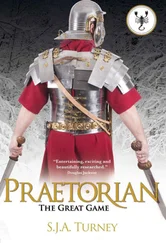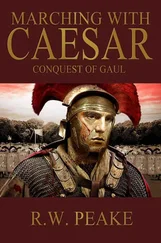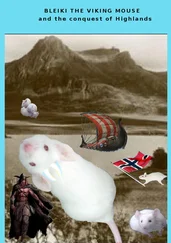S. Turney - The conquest of Gaul
Здесь есть возможность читать онлайн «S. Turney - The conquest of Gaul» весь текст электронной книги совершенно бесплатно (целиком полную версию без сокращений). В некоторых случаях можно слушать аудио, скачать через торрент в формате fb2 и присутствует краткое содержание. Год выпуска: 2011, Жанр: Исторические приключения, на нидерландском языке. Описание произведения, (предисловие) а так же отзывы посетителей доступны на портале библиотеки ЛибКат.
- Название:The conquest of Gaul
- Автор:
- Жанр:
- Год:2011
- ISBN:нет данных
- Рейтинг книги:5 / 5. Голосов: 1
-
Избранное:Добавить в избранное
- Отзывы:
-
Ваша оценка:
- 100
- 1
- 2
- 3
- 4
- 5
The conquest of Gaul: краткое содержание, описание и аннотация
Предлагаем к чтению аннотацию, описание, краткое содержание или предисловие (зависит от того, что написал сам автор книги «The conquest of Gaul»). Если вы не нашли необходимую информацию о книге — напишите в комментариях, мы постараемся отыскать её.
The conquest of Gaul — читать онлайн бесплатно полную книгу (весь текст) целиком
Ниже представлен текст книги, разбитый по страницам. Система сохранения места последней прочитанной страницы, позволяет с удобством читать онлайн бесплатно книгу «The conquest of Gaul», без необходимости каждый раз заново искать на чём Вы остановились. Поставьте закладку, и сможете в любой момент перейти на страницу, на которой закончили чтение.
Интервал:
Закладка:
Fronto turned a corner and saw a sign for a tavern. Here in Cisalpine Gaul, the influence of Roman civilisation had all but wiped the Gaulish culture from the land, and the street and tavern could easily have been on the outskirts of Misenum or Puteoli, his home town. After three days of almost constant rain, one could only wade through these badly paved streets and, as Fronto reached the front door, under the swinging, rusty sign, he took advantage of the boot scraper by the door, leaving large clods of earth. The inside, lit only by three small oil lamps, was dingy and only four men sat around the room, sipping wine or swigging beer. Fronto ordered a good wine and took a seat in a dark corner. His thoughts turned once more to the people known as the Gauls. It was a misnomer really. The innkeeper who had served Fronto’s drink was theoretically a Gaul, though Fronto could hardly compare this Latinised man with his slight Etrurian accent to the Gauls that had broken Rome so long ago. Nor, for that matter, with the feared Belgae or Helvetii, hardened by centuries of war amongst themselves and against the Germans across the Rhine.
Still, the Helvetii would be the ones to watch. Not only were they just over the border from here, but there had been rumours emanating from their territory for a long time now. Roman merchants had made a killing there, buying up food stocks and carts and pack animals and all manner of other goods. Each officer had his own opinion on the activities of the Helvetii, ranging from an expansion into Sequani territory, to crossing the Rhine and claiming land in Germany, to invading Gaul. There was no doubt that the Helvetii loved to make war, and the only question really was against whom. One thing that all were sure of was that the Helvetii, warlike as they were, would never consider attacking the might of Rome. And yet two things nagged at Fronto. First was Caesar’s sudden fascination with further Gaul and its tribes, and the other was a conversation he had had yesterday with a local merchant. The man, from whom many of the officers had been purchasing items for months, had been packing all his worldly goods onto a cart when Fronto came across him. Upon being asked why, the man had replied “Have you never seen the birds fleeing the forest when a predator enters?” and had refused to be pressed further.
Matters to think on; Fronto pondered as he drained the glass. He purchased another at the bar and then returned to his dingy table. The General was renowned for his ability to think problems through obliquely. Was it possible that the General had already taken stock of what had happened and used it to create a hypothesis of events in the near future? Did Caesar actually think that the Helvetii would invade Roman territory? Were it from anyone else Fronto would have laughed off such an idea, but from the General? Fronto had played the man at Latrunculi several times and considered it a personal mark of glory that he had once won a game. Fronto was at least as well versed in the rules of the game as any other well-bred Roman, and better than most, but Caesar was another matter entirely. He had a disturbingly clever habit of having calculated every possible combination of moves at least seven turns ahead. It was this gift for strategy that made Caesar as dangerous in the field as he was on the board.
In response to his unsettled feeling, Fronto had put his command, the Tenth, on a state of alert within moments of Caesar’s arrival at the camp. There had been plenty of complaints from the senior centurions of course, but Fronto had silenced them with a look. He had commanded legions before, under this General and others. The senior men of the Tenth knew that; they also knew that something was in the wind. Fronto also had a habit of being prepared.
He sighed and wondered whether he would be a legionary officer all his life. He had served in a number of theatres and commanded a number of legions as and when he had been required. Commanding a legion had always been a temporary post at the whim of the army’s General, and in those days Fronto had been keen and continually seeking a new challenge. Caesar had broken tradition in many ways, including his tendency to leave an officer in command of a legion for long periods. Thus in Spain, Fronto had commanded the Ninth for a considerable time, becoming very familiar with its officers and their quirks. In fact long-term command had permanently changed Fronto’s views and attitudes toward the military, and he could see the benefit of building a rapport with a legion.
His command in Spain had perhaps tied him a little too closely to Caesar and he had narrowly escaped prosecution along with the General, after which he had tried to dabble in political circles at Rome as the cursus honorum demanded. A dull and incomprehensible two years in Rome had given Fronto enough of a taste of Rome’s political life to know that his place was in the field, and he had applied to the Senate once more for a command. For over a year he served in various locations, never tied to a unit for more than a month, his reputation constantly growing, until he heard of his old patron’s appointment as governor of Illyricum and Cisalpine Gaul. Sure of his path, he had visited Caesar and asked the General if there was a place in Gaul for him. Caesar had smiled and, without hesitation, sent him to Aquileia to command the Tenth, whose current commander was returning to Rome.
He was fated to the soldier’s life. He would never sit in the Senate; he may never make a Provincial Governor, and he was resigned to that. Only two things still ate away at him late at night. Firstly there were the young, go-getting officers, just starting off on the cursus honorum, who could not comprehend why a man would backtrack down the rungs of the ladder. Fronto suspected that they laughed about him behind his back. The other was, of course, his family. Neither his mother nor his sister had ever forgiven him for his abortive political career, when he had been expected to make Senator at least. He knew he was bright enough, as did the womenfolk, but he preferred the clear-cut blacks and whites of military command to the soul-destroying greys of politics. Throwing back the last of his second unwatered cup faster than he probably should, Fronto stood, thanked the barman, and made his way out of the tavern.
The streets of the town were muddy, dark and deserted, and Fronto carefully picked his way through the murky alleys until he came out near the bridge. So deep in thought was he that he almost knocked down the figure entering the alley as he left it. Gnaeus Vinicius Priscus, the Tenth’s leading centurion, staggered against the wall, righted himself quickly and saluted Fronto. The officer waved the salute aside and growled, covering his own embarrassment.
“Priscus, what the hell are you doing sneaking around down here at this time of night? Haven’t you got duties in camp?” He grasped the centurion by the shoulder fastenings of his mail shirt and turned him around, walking him out of the alley.
Priscus looked momentarily taken aback and for a second a fleeting and knowing smile crossed his face before professionalism took over. “Sir. I was, in fact, looking for you. One of the gate guards told me you had come down here. We intercepted a messenger coming to the camp. I thought you would want to know before word reached the other officers.”
“A messenger?” Visions of Gaulish hordes sweeping south across the Empire’s borders ran unbidden through his mind. “A messenger from whom?”
Priscus stumbled on the dark road; looked up in time to see that they were emerging into the faint circle of light cast by the torches on the camp’s walls.
“One of our friendly merchants, up on the frontier, near the Helvetii. It seems big things are happening over the border. His message was for the officer commanding, but I got a few hints. There’s been some kind of failed coup in the tribe’s leadership.” Priscus held up his hand and signalled to the guards, who swung open the great wooden gates to allow them entry.
Читать дальшеИнтервал:
Закладка:
Похожие книги на «The conquest of Gaul»
Представляем Вашему вниманию похожие книги на «The conquest of Gaul» списком для выбора. Мы отобрали схожую по названию и смыслу литературу в надежде предоставить читателям больше вариантов отыскать новые, интересные, ещё непрочитанные произведения.
Обсуждение, отзывы о книге «The conquest of Gaul» и просто собственные мнения читателей. Оставьте ваши комментарии, напишите, что Вы думаете о произведении, его смысле или главных героях. Укажите что конкретно понравилось, а что нет, и почему Вы так считаете.












